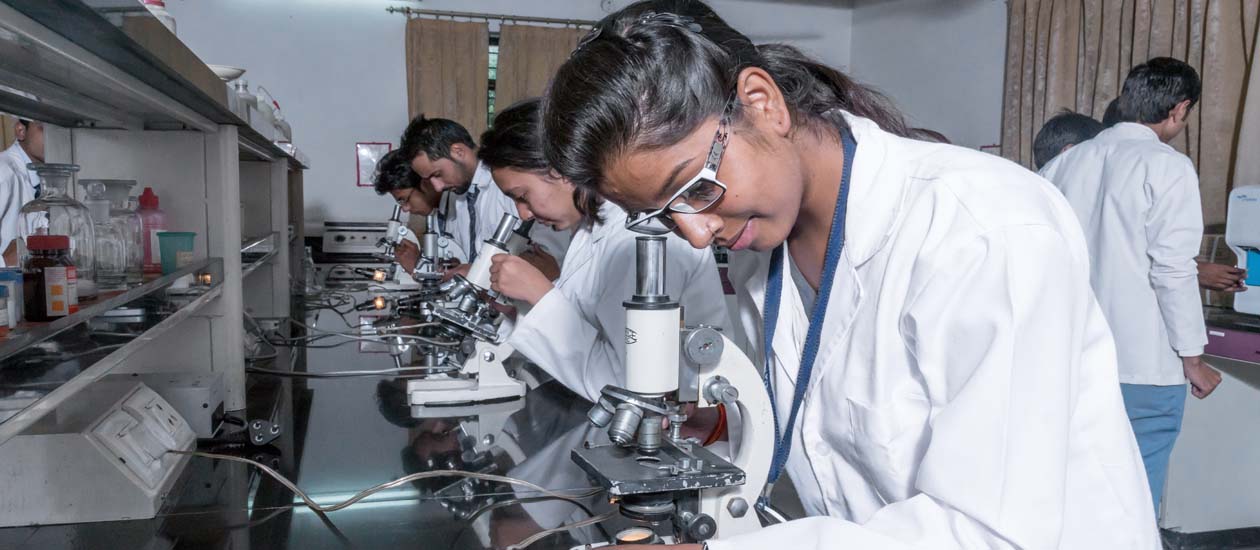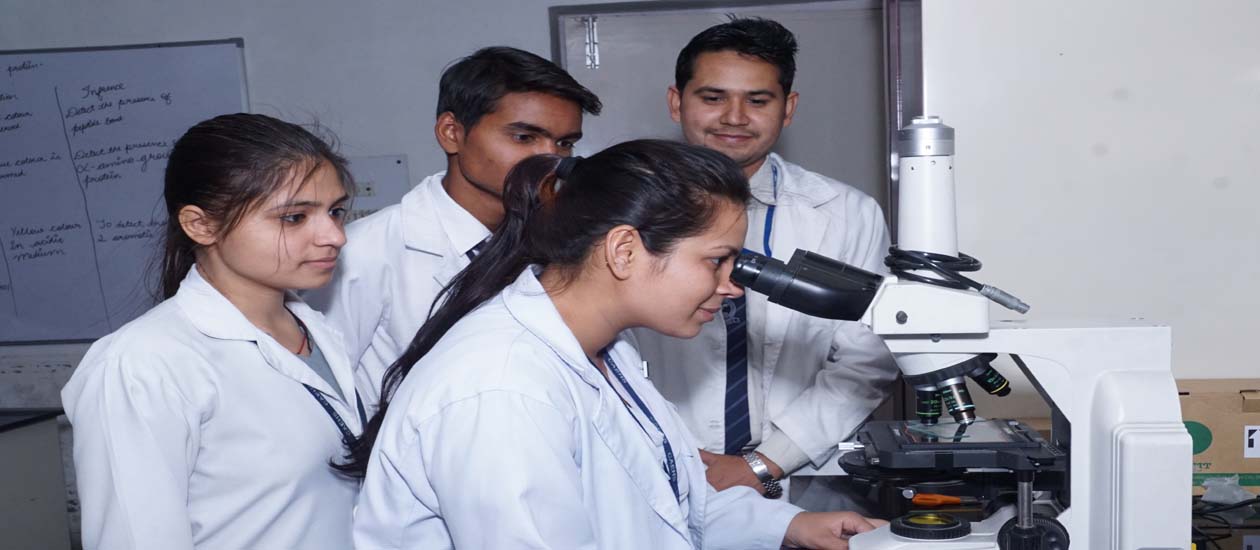Biosciences Department
Courses Offered:
B.Sc. Microbiology
B.Sc. Biotechnology
M.Sc. Microbiology
M.Sc. Biotechnology
M.Sc. Biochemistry
M.Sc. Bioinformatics
In this department, we provide you with excellent required lab facilities which will help the students to apply the knowledge in a research investigation. All faculty members are committed to developing strong mentoring relationships with students. We will give you individual attention and guidance every step of the way.
The laboratories are well equipped with instruments like: PCR, Analyzer, UV/ VIS spectrophotometer, ELISA reader , Fluorescent microscope , Bright field microscope with phase contrast and dark field attachment ,-20oC deep freezer , -80oC deep freezer, Gel documentation system, Horizontal and vertical sterilizers ,electrophoretic units, Sonicator, laminar flow, autoclave, incubator, hot-air oven, distillation plant, refrigerator for storage of bacterial cultures, microscopes, anaerobic jars, candle jars, Seitz filter, centrifuge, microtome wire loop, necessary reagents, drugs, stains, swabs, etc. etc which are in housed in big labs.
Microbiology is the study of microorganisms that are too small to see without the use of a microscope.
Course Contents :
Bacteriology, virology, phycology, mycology, parasitology, biochemistry, biophysics, bio-statistics, immunology, medical microbiology, molecular biology, fermentation technology, microbial genetics, recombinant DNA technology, industrial microbiology, instrumentation, microbial physiology, food microbiology, soil microbiology.
Scope of Microbiology:
Microbiologists study the associations between microbes, human beings, animals and plants. The specialized branches of microbiology are as:
- Industrial microbiologist exploits microbes to produce products viz. alcoholic beverages, amino acids, antibiotics, organic acids and Vitamins.
- Clinical or Medical Microbiologist study the role of microorganisms in human and animal diseases and hunt for means to avert and cure diseases.
- Agriculture microbiologist study role of micro-organisms in soil fertility, plant diseases, and spoilage of produce by microbes.
- General microbiologist studies the basic features of microbes, with reference to structure, physiology, genetics, metabolism, physiology and ecology.
- Marine microbiologist concentrates on the cosmic number of micro-organisms in the oceans.
- Environmental microbiologist investigates the consequence of microbial processes on environment.
- Another emerging field is Exo-microbiology and space microbiology, which deals with exploration of life in external space.
Biotechnology:
The term "biotechnology" refers to the use of living organisms or their products to modify human health and the human environment.
Course contents:
Genetic engineering, genomics, proteomics, tissue culture, enzymology, biophysics, bio-statistics, immunology, bacteriology, virology, molecular biology, fermentation technology, microbial genetics, recombinant DNA technology, environmental biotechnology, instrumentation, bio-informatics and computer applications.
Scope of Biotechnology:
- Gene therapy: allow a person suffering from a disabling genetic disorder to lead a normal life.
- Immuno-technologies: Such as monoclonal antibodies for diagnosis and therapy. Antibodies present in humans enable them to fight incursion of their bodies by harmful chemicals or micro organisms.
- Tissue culture: Tissue culture of both plant and animal cells. These are used for Micro propagation of elite or exotic materials.
- Stem cell techniques: Which would involve purification and isolation of stem cells from various tissues and develop into the desired tissue.
- New DNA technologies: These include DNA fingerprinting, sequencing of genomes, development and use of new molecular markers for plant identification and characterization.
- Other fields of biotechnology are nano biotechnology, bioinformatics, drug designing and DNA vaccines.
Biochemistry:
Biochemistry is a division of science which studies chemistry of the living organisms. The study of biochemistry includes structural and functional cellular components such as nucleic acids, proteins, bio-molecules and carbohydrates.
Biochemistry encompasses both chemistry and biological science and hence aperson graduating in biochemistry gathers knowledge about both the fields. Professionals in biochemistry are known as biochemists.
A biochemist is an individual who studies about the characteristics of organisms and their biological processes. Biochemists have various specializations and almost all the specializations require good research techniques and the ability to combine and analyze information.
Scope:
· Clinical Scientist
· Research Associates
· Biomedical Scientist
· Pharmacologist
· Laboratory Technician
· Biotechnologist
· Research Scientist
· Chemist
· Microbiologist


